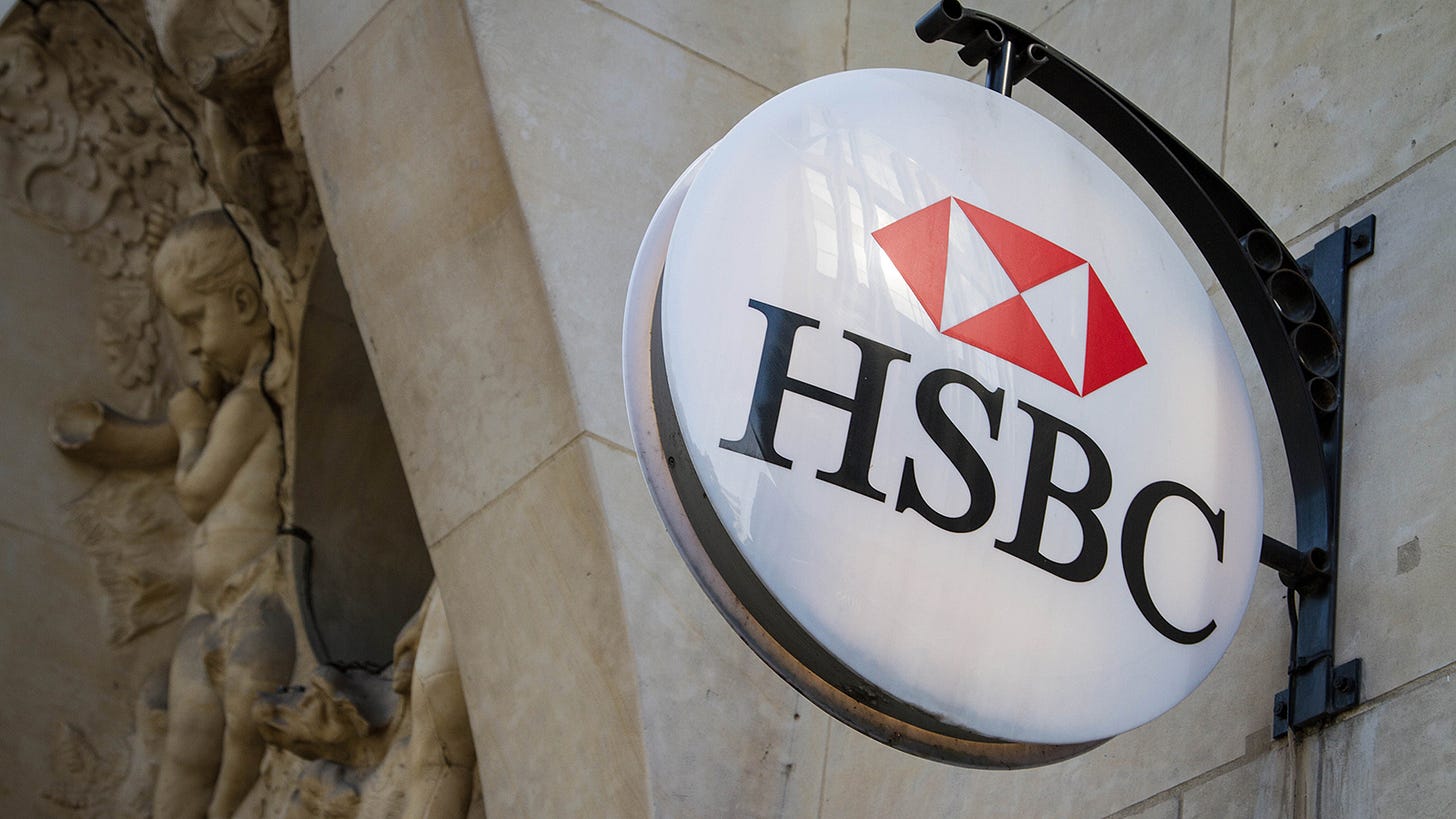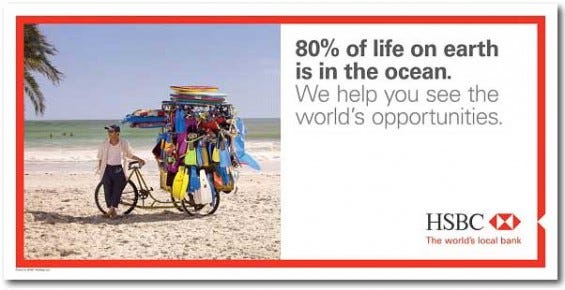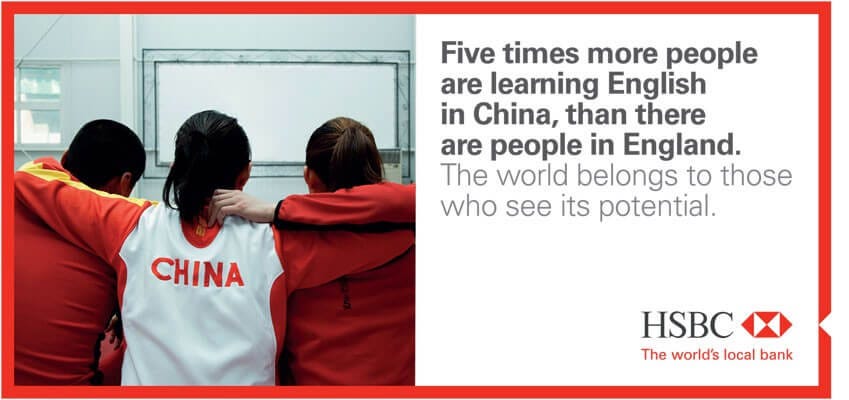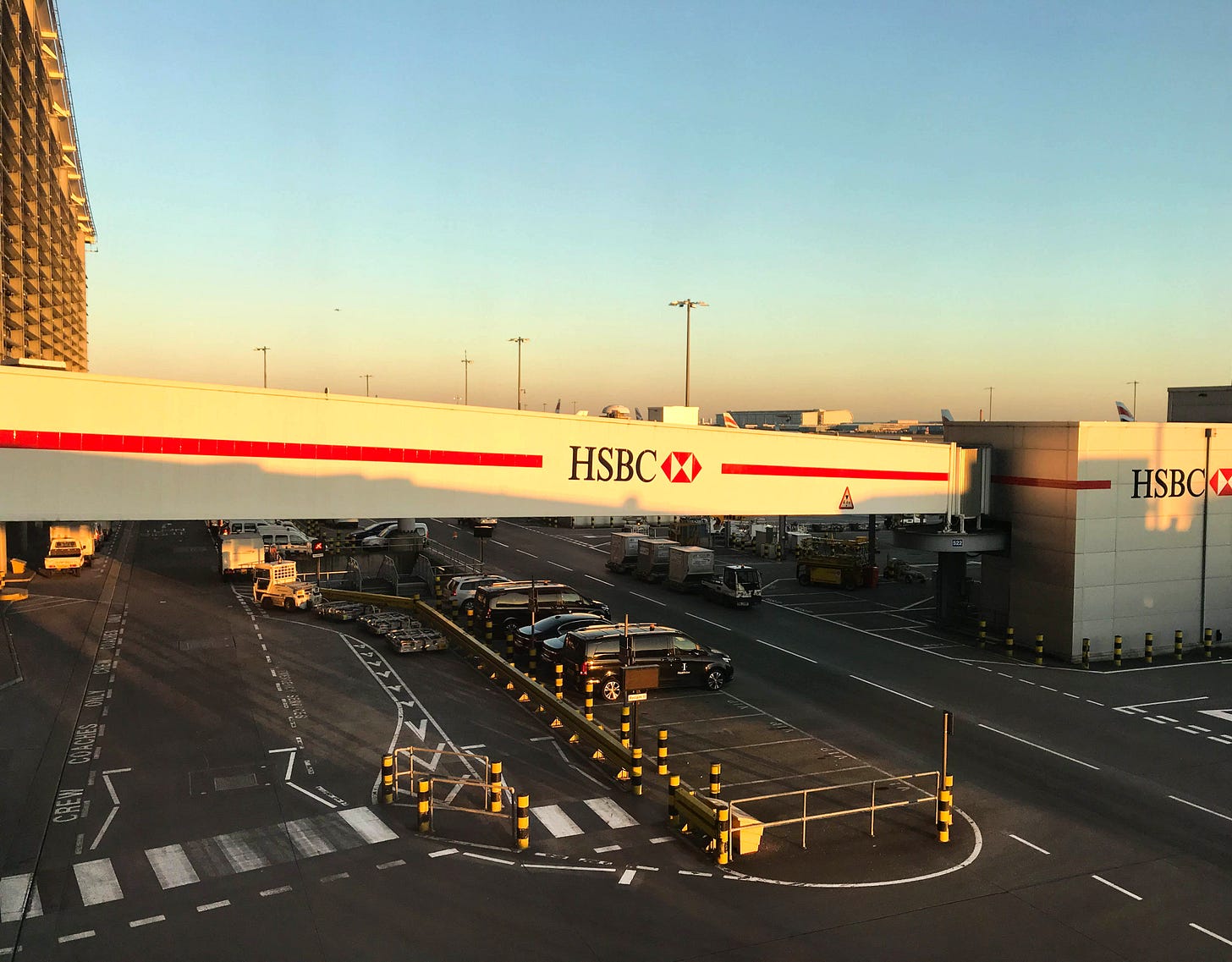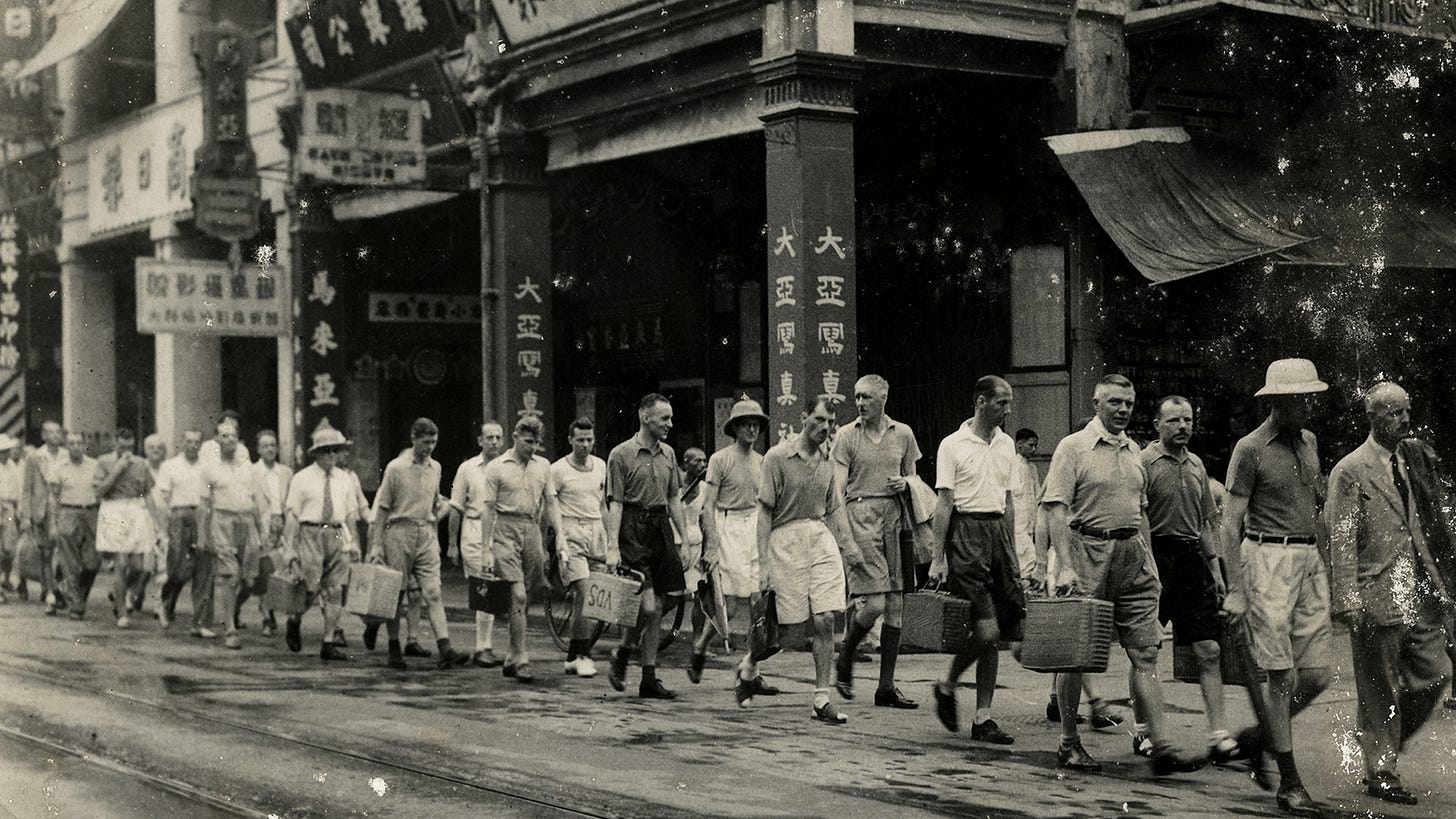How the Fate of HSBC Reflects the Future of Globalization
The venerable global bank has played a unique role in the story of globalization. Caught in the cross-fire of U.S-China tensions, HSBC's battle to stay whole is a test of our times.
If you’ve been a regular international traveler over the past decade, you are familiar with this landing routine. Jet-lagged and bleary-eyed, you disembark in Hong Kong or Dubai or London or ‘wherever-istan’, and begin your long shuffle toward the immigration desk to the sound of smartphones pinging, carry-on wheels rolling, and the quick, determined footsteps of fellow travelers angling for the best spot in the passport line.
You look out the massive windows and see the instantly recognizable (by you) logos on the aircraft of the major global airlines: Lufthansa, British Airways, Emirates, Qatar Airways, Singapore Airlines. You walk as briskly as your weary legs allow and glance at the advertisements on the walls, the brands that tout smartphones or luxury goods or banking services — Huawei and Apple, Gucci and Breitling, ING and HSBC.
In fact, it’s the last one — HSBC — that has seemed most ubiquitous to me in my travels. How many times have you walked in a semi-dazed post-flight stupor past a sign like this one below?
Or perhaps, fresh and hopeful before boarding your flight, you saw this one:
In fact, it may have even been an HSBC-branded airbridge like this one below at London Heathrow that got you from your airplane to the terra firma of the airport.
If the bustling international airport is the symbol of globalization, then the HSBC ad has surely been its most visible adornment. While some people hum advertising jingles they can’t get out of their heads, you and I, dear fellow travelers, know this tagline by heart: “HSBC: The World’s Local Bank.” That bit of branding has been so seared in my head that I hardly noticed that HSBC quietly retired that campaign in 2016 after it sold off some of its worldwide branches in the wake of the global financial crisis.
But HSBC, to me, also symbolizes something else far more enduring: the march of globalization and its peaks and valleys over more than a century and a half. Indeed, an enterprising young historian might even consider an ‘HSBC-ometer’ to gage the temperature of globalization at any time in history by checking on the fortunes of the venerable bank born in 1865 as the Hong Kong and Shanghai Banking Corporation.
After all, HSBC has seen it all: two world wars and numerous regional ones, pendulums swinging wildly in geopolitics and markets and technologies, global and regional financial crises, recessions and revolutions, the dizzying growth of trade and connectivity and, of course, massive changes in the country of its birth - China.
Founded by an enterprising young Scotsman, Thomas Sutherland, who sensed an opportunity for a new bank to fuel the growing trade that he saw all around him in Hong Kong and ports in China and Japan, HSBC’s origin story was shrouded in the geopolitics of the day. After all, Sutherland was trading in Hong Kong because China lost the so-called Opium War (1839-42) to Great Britain. A key spoil of war: the handover of Hong Kong to the British.
As the official HSBC history notes: “the dynamic Scot created a prospectus and used his standing and connections in the Hong Kong business community to gain support for the venture…The shares sold quickly and The Hongkong and Shanghai Banking Corporation Limited was born.”
(HSBC’s First Building. Hong Kong, 1865. Photo Credit: HSBC History Timeline)
Fast forward more than 150 years later and HSBC Holdings PLC, headquartered in London and with operations worldwide, is now the 8th largest bank in the world with nearly $3 trillion in assets, and 40 million customers in 64 countries.
Any bank of that size and reach will be buffeted by geopolitical winds at all times, but HSBC seems to be uniquely caught in today’s moment of rising U.S-China tensions. One of its biggest shareholders, China’s Ping An Insurance, is calling for the venerable bank to be split into two separate entities: a Hong Kong-listed operation that would handle its Asian operations, and one that would handle the rest. They point to rising US-China tension as a key concern. They also point out that Asia provides the bulk of HSBC’s profits. A solely Asia-focused bank would be better for shareholders, they say.
Consider the following chart below. It shows the breakdown of HSBC’s profits before tax across the world. Asia indeed dominates.
But, still, the question remains: why split up? After all, one of the selling points of HSBC and banks like it are their global reach. Its Asian operations most certainly benefit from that reach.
So, is something else going on here? Is there a Deep State China hand behind Ping An’s insistence on the break-up? Is this a geopolitical break-up?
The FT quotes a former senior executive of HSBC as saying Ping An “would have had air cover from Beijing” on such a move.
And, here’s the money quote
“It’s simple politics. Ping An is the shareholder but everything is centralised in China, nothing happens without the party saying ‘boo’,” said a veteran banking executive in Hong Kong who works closely with Beijing. As China has increased its grip on Hong Kong in recent years, localising control of the city’s biggest bank would make sense.
Chinese President Xi Jinping’s recent highly choreographed visit to Hong Kong — billed as a commemoration to mark 25 years since the handover from the United Kingdom to China — should be seen as a deliberate set piece to tell the world and Hong Kongers: the ‘city-state’ is firmly in China’s firmament. A bank like HSBC — with headquarters in London and under UK regulatory authority - would surely rankle the notoriously controlling President Xi.
HSBC’s origins in the new world created by the Opium War defeat would only further rankle the Chinese President who has spoken openly about the ‘century of humiliation’ China faced before the Communist Revolution.
Meanwhile, HSBC also faces scrutiny from Western capitals at a time of tensions with China. Seen as too accommodating to Beijing, here’s another money quote from the FT:
“HSBC is in the least tenable position of any financial institution in the world on the US-China conflict. They’re in a position where everyone hates them — the UK, France, the US, Hong Kong and China. I don’t see a path out of their current situation today and I don’t see the geopolitical tension getting better,” said the second top-10 shareholder.
HSBC Holdings PLC will not meekly agree to this proposal, of course, and the student of history might see this challenge as a mere trifle compared to the problems the bank has faced through wars and revolutions. HSBC has hired Goldman Sachs - another venerable banking survivor - and Robey Warshaw to come up with its defense.
On its merits, a break-up makes little sense to me. Why would you dilute a global brand like HSBC, a top 10 bank in terms of assets, and one with powerful networks that help lubricate global trade?
But, surely, we are in a moment of de-globalization, the pundits tell us. Maybe an HSBC break-up is part of this moment? As I’ve written before, don’t believe the ‘globalization is dying’ narrative. Let me borrow from Mark Twain, who read his own obituary in the newspaper, and wrote to the editor: “the news of my demise has been greatly exaggerated.” So, too, the news of globalization’s demise.
As I wrote in a previous column:
If we define globalization as the increasing cross-border interconnection of goods, people, services, capital and ideas — and not the convergence toward Western ideas and structures, as some define it — then it remains alive and well. In a world of $28 trillion of trade (goods and services), dizzying supply chains, elaborate spider webs of air and sea connectivity (look at the flight maps of a major carrier, or the route maps of a major shipper), trillions in foreign direct investment, and tens of billions in cross-border portfolio flows every month, it’s hard to see that world crumble anytime soon.
It’s also worth remembering that HSBC has seen much tougher times than these. Just a year after its birth, six of its foreign bank competitors collapsed amid bank runs. HSBC survived that early test.
The early to mid twentieth century was also rough for the bank.
As the official HSBC history writes
After the First World War, the bank expanded in Asian markets, where trade in rubber and tin was booming. The expansion of branches in Bangkok, Manila and Shanghai underlined its confidence in business in the region. But along with its customers, HSBC suffered during the Great Depression. In the 1930s, its inner reserves were drawn down and the bank focused most of its resources on survival rather than expansion. Staff bonuses were cut or cancelled and shareholder dividends were reduced.
The Second World War was an even tougher period for the bank. It survived thanks to its significant reserves and careful management, which allowed the business to retain a strong foundation for growth when peace returned.
All of this suggests that HSBC has seen tougher challenges than a shareholder with 9.2% of its shares calling for its break-up. The question remains: Is Beijing behind this and, if so, how hard will they push? We’ve seen what they are capable of: China’s big tech companies have been brought down several notches over the past two years through state actions. Trillions in market cap have been wiped out, not to mention the unquantifiable loss of trust by foreign investors.
The two bronze lions that stand outside the headquarters of HSBC in Shanghai and Hong Kong stand sentry, symbols of a bank that is, in itself, a symbol of globalization. Over the years, young couples took to bringing their toddlers to stroke the lion sculptures, hoping HSBC’s positive feng shui would rub off on their progeny.
My hunch is that the break-up plan won’t work, and HSBC will see off this challenge, like it has many others over the years. Still, the bank will need all of that positive feng shui today to survive its latest test.
And…please send us tips, ideas, cool vintage photos, must-listen podcasts etc or just a ‘hello’ to emergingworld85@gmail.com


